|
 Attracting Hummingbirds Attracting Hummingbirds  Below right - Female Ruby-throated Hummingbird feeding from Trumpet vine.
Below left - Male Calliope (foreground) and Female Broad-tailed Hummers.
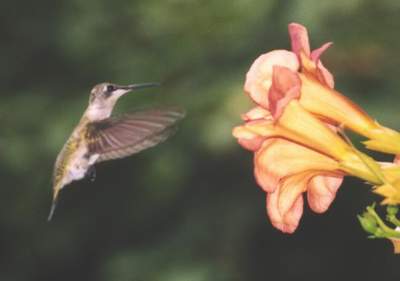 Hummingbirds are a delight to watch, maneuvering effortlessly from one flower to another, pollinating as they go. With flight speeds recorded up to 60mph they use a lot of energy and are in constant need of suitable nectar rich flowers. Providing syrup feeders is one way of attracting these flying jewels into your yard along with a variety of tubular shaped flowers in the colors of red, orange, blue, purple and white, which are their favorites. I use several feeders in my yard to attract the hummingbirds but they also get a great deal of nectar from my plantings, especially from plants such as the Salvias - Salvia greggii (autumn sage), Salvia coccinea (tropical sage), Trumpetvine and Turks cap. These, as well as other plants and feeders in my area are visited by the Ruby-throated and Black-chinned Hummingbirds & as of 11/27/03 Female Rufous Hummingbirds! (see link below) Hummingbirds are a delight to watch, maneuvering effortlessly from one flower to another, pollinating as they go. With flight speeds recorded up to 60mph they use a lot of energy and are in constant need of suitable nectar rich flowers. Providing syrup feeders is one way of attracting these flying jewels into your yard along with a variety of tubular shaped flowers in the colors of red, orange, blue, purple and white, which are their favorites. I use several feeders in my yard to attract the hummingbirds but they also get a great deal of nectar from my plantings, especially from plants such as the Salvias - Salvia greggii (autumn sage), Salvia coccinea (tropical sage), Trumpetvine and Turks cap. These, as well as other plants and feeders in my area are visited by the Ruby-throated and Black-chinned Hummingbirds & as of 11/27/03 Female Rufous Hummingbirds! (see link below)
For hummers, I do not recommend using water that is already tinted red and do not add food coloring to make the syrup red either. The feeder should have enough red on it to attract the hummer. To make the sugar water mix 1 part sugar to 4 parts water (no stronger, as this can cause damage to the hummingbirds kidneys) Add to a saucepan and bring the mixture to a boil. This will kill any bacteria. Allow to cool before putting into the feeders. If making a large batch the syrup can be kept in the refrigerator for up to a week. 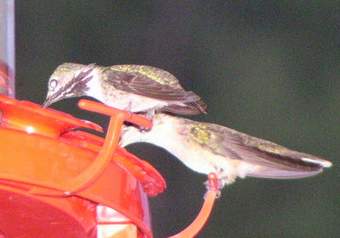 Water may have to be changed every couple of days depending on how many hummers you get and how high the temperature is in your area. Mold can grow very quickly with hot weather. Also if the feeder can be hung in the shade somewhere even better. Hummingbirds can be very territorial and will guard "their" feeders from any other hummingbird trying to use it. To help prevent this space the feeders far enough away or out of sight of each other. In some locations where hummers are very plentiful, grouping of feeders does not seem to be a problem. Water may have to be changed every couple of days depending on how many hummers you get and how high the temperature is in your area. Mold can grow very quickly with hot weather. Also if the feeder can be hung in the shade somewhere even better. Hummingbirds can be very territorial and will guard "their" feeders from any other hummingbird trying to use it. To help prevent this space the feeders far enough away or out of sight of each other. In some locations where hummers are very plentiful, grouping of feeders does not seem to be a problem. Note - When cleaning feeders, using soap of any kind is not recommended. Instead, use very hot water with grains of rice, shake vigorously to remove any mold growth then empty and rinse well. Once a month feeders can be cleaned with 1/4 Cup of bleach to 1 Gallon of water & soaked for about an hour. Brush if necessary & rinse VERY thouroughly.
Vinegar is also used sometimes as it has an acid effect which may help slow mold growth when used to wash with. Again, rinse thoroughly with plain water before adding the sugar water.
Rufous Hummingbirds... 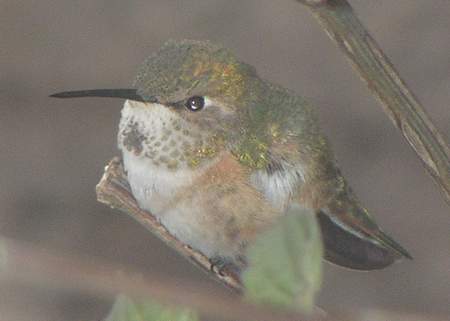 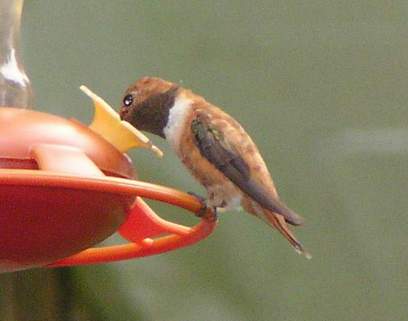
Above left - Female Rufous, Right - Male Rufous.
On Thanksgiving day 11/27/03 a Female Rufous Hummingbird ("Missy") showed up at my house, feeding on the Salvia plants in the front flower beds. Then on 12/3/03 another one, an immature ("Spirit") also showed up! They both stayed the whole winter till the following March. Then, on 7/30/04 a female Rufous returned to the yard with bahaviours and preferences very similar to "Missy" from the previous winter & which I do now believe to be her. An Adult Male Rufous also showed up on 9/27/04 and stayed through the winter until early Spring 2005.
Rufous Hummingbirds show up in southern and eastern states during fall migration & many stay for the winter if there are enough insects & if food from plants and feeders remain available. If you live in the south / southeast & continue to keep your sugar feeders out all winter you increase the chances of having Rufous Hummingbirds visit your garden during Fall, Winter and Spring months.
To see photos of the Rufous Hummingbirds that showed up in my yard click here -
My Rufous Hummingbirds See also -
Hummers In The House
... about the capture and release of two separate Ruby Throated Hummingbirds which flew into our house.
Plants for Hummingbirds...
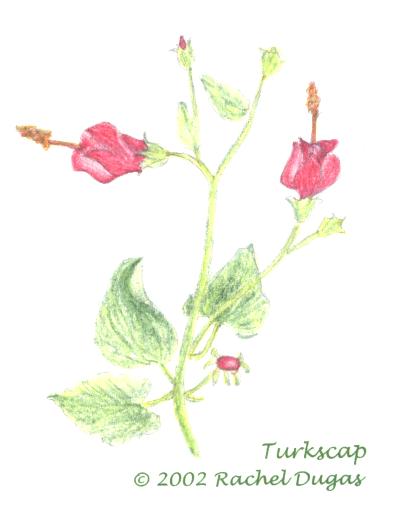
Flame Acanthus (Anisacanthus quadrifidus var. wrightii) Tropical Sage (Salvia coccinea) Autumn Sage (Salvia greggii) Big Red Sage (Salvia penstemonoides) Mealy Sage (Salvia farinacea) Blue Sage (Salvia texana) Purple Horsemint (Monarda citriodora) Beebalm (Monarda didyma) Prairie Brazoria (Brazoria scutellarioides) Wild Columbine (Aquilegia canadensis)  Drummonds Phlox (Phlox drummondii) Standing Cypress (Ipomopsis rubra) Lantana (Lantana horrida) Butterfly bush (Buddleia davidii) Indian Paintbrush (Castilleja indivisa) Red yucca (Hesperaloe parviflora) Turks Cap (Malvaviscus drummondii) Mexican Petunia (Ruella sp.) Coralbells (Heuchera sanguinea) Cardinal Flower (Lobelia cardinalis) Catchfly (Silene subciliata) False Indigo (Amorpha fruticosa) Rattlebush (Sesbania drummondii) Globe Mallow (Sphaeralcea angustifolia) Coral Honeysuckle (Lonicera sempervirens) Trumpet Vine (Campsis radicans) Cross vine (Bignonia capreolata) Snapdragon Vine (Maurandya antirrhiniflora) Coralbean (Erythrina herbacea) 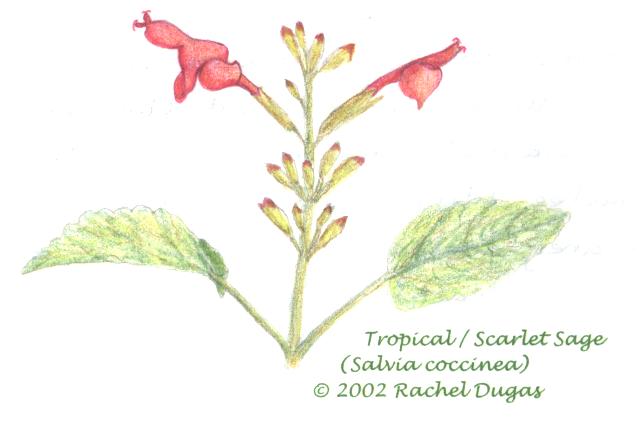 Cypress Vine (Ipomoea quamoclit) Cypress Vine (Ipomoea quamoclit) Cardinal Vine / Climber (Ipomoea sloteri) Scarlet-Runner Bean (Phaseolus coccineus) Carolina Jessamine (Gelsemium sempervirens) Texas Clematis (Clematis texensis) Dessert Willow (Chilopsis linearis) Red & White Buckeye (Aesculus pavia)
Hummingbirds in North America... Below - Broad-tailed Hummingbird
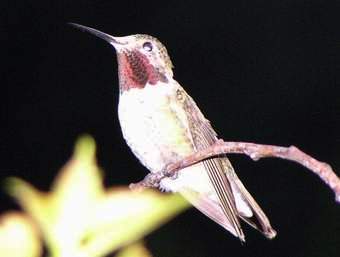
Ruby-throated Hummingbird
Black-chinned Hummingbird
Allen's Hummingbird
Rufous Hummingbird
Broad-tailed Hummingbird
Calliope Hummingbird
Costa's Hummingbird
Anna's Hummingbird
Magnificent Hummingbird
Blue-throated Hummingbird
White-eared Hummingbird
Broad-billed Hummingbird
Buff-bellied Hummingbird
Berylline Hummingbird
Violet-crowned Hummingbird
Lucifer Hummingbird
Plain-capped Starthroat (rare)
Green Violet-ear (rare)
Green Breasted Mango (rare)
Hummingbird Links... Right - Broad-billed Hummingbird
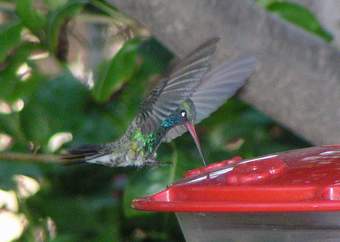 The Hummingbird Society Dedicated to Hummingbird Fans.
The Hummingbird Society Dedicated to Hummingbird Fans.
Texas Hummingbird Roundup Hummer distribution in Texas.
West Texas Hummingbirds The Hummingbirds of West Texas.
Hummingbirds.net Info on North American Hummingbirds.
Hummingbird migration Track and report Ruby Throated Hummer sightings.
Hummingbirds.net/best1mod.html Modifying Best-1 Hummingbird feeders for safety
The Hummingbird Website Lots of info, and Hummer plants for different regions.
The Spruce The 7 Best Hummingbird Feeders of 2019.
The Spruce Attracting Hummingbirds With Water.
Hummingbirds Forever A store selling Hummingbird products.
Trochilids web page Stacy J. Peterson's Hummingbird distribution maps.
Greg Lasley Nature Photography Hummingbird & Nature Photographs.
Greg Scott's Home Page High resolution Hummingbird photos.
Winter Hummingbirds Winter Hummingbirds of Southwest Louisiana
Rubythroat.org Operation Rubythroat, The Hummingbird Project.
Worldofhummingbirds.com Lots of info in one place for attracting hummingbirds.
Hummingbird Banding Who bands birds and why.
Humingbird world - Resources WWW Sites for Hummingbird Lovers.
Hummingbird ID Site Excellent ID Info on US Hummingbird Species.
Birds-n-garden.com All about hummingbirds, lots of resources.
Southeastern Arizona Bird Observatory Hummingbird Watching in Southeastern Arizona.
The Pennsylvania Winter Hummerland. Wintering Hummingbirds in Pennsylvania.
Hummingbirds of the World Beautiful photos of Hummingbird species.
Enjoyable Hummingbirds Lots of photos of Ruby-throated Hummers and other species.
Butterflybushes.com Hummingbird Attracting Plants
Hummingbirds in Houston Info including arrival dates, facts, plants & feeders.
Hummingbird Nest Photos taken of nesting Allens Hummer in Oso Flaco Dunes nature preserve, Central Coast CA.
The Hummingbird Diaries A Pictorial History. Nest of baby hummingbirds!
Hummingbird Pictures Guide A guide to hummingbirds with pictures and information on each bird.
Hummingbird-guide.com The Hummingbird Guide - "Everything About Hummingbirds"
fatruby.com Assorted Hummingbird Feeders.
Tejashummer.com Tejas Hummingbird Feeders
Salviaspecialist.com A list of salvias for purchase, with useful photos.
TX Hummer Hummingbird listserve for Texas
Hummingbird Books...
Hummingbirds of North America A Photographic Guide.
A Field Guide to Hummingbirds of North America (Peterson field guides)
Stokes Hummingbird Book The Complete Guide to Attracting, Identifying, and Enjoying Hummingbirds.
The Secret Lives of Hummingbirds By David Wentworth Lazaroff
The World of the Hummingbird By Robert Burton.
A Hummingbird in my House The Story of Squeak.
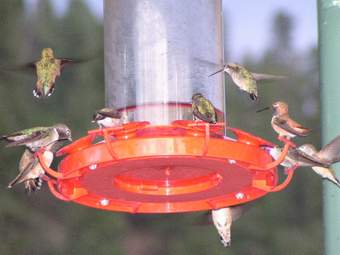
Feeding frenzy at a feeder I watched in New Mexico where there were at least 200 Hummers! This was just one feeder out of seven I focused on. The three species were Rufous, Broad-tailed and Calliope. During peak season they go through 50lbs of sugar a WEEK!

Back to - Gardening for Wildlife
Gardening for Birds - Bird Misters, Drippers and Puddles! - Gardening for Butterflies
Gardening with Solitary Bees - A Garden Pond
© Copyright 2025, All rights reserved. 6357
|


 Attracting Hummingbirds
Attracting Hummingbirds 



 Hummingbirds are a delight to watch, maneuvering effortlessly from one flower to another, pollinating as they go. With flight speeds recorded up to 60mph they use a lot of energy and are in constant need of suitable nectar rich flowers. Providing syrup feeders is one way of attracting these flying jewels into your yard along with a variety of tubular shaped flowers in the colors of red, orange, blue, purple and white, which are their favorites. I use several feeders in my yard to attract the hummingbirds but they also get a great deal of nectar from my plantings, especially from plants such as the Salvias - Salvia greggii (autumn sage), Salvia coccinea (tropical sage), Trumpetvine and Turks cap. These, as well as other plants and feeders in my area are visited by the Ruby-throated and Black-chinned Hummingbirds & as of 11/27/03 Female Rufous Hummingbirds! (see link below)
Hummingbirds are a delight to watch, maneuvering effortlessly from one flower to another, pollinating as they go. With flight speeds recorded up to 60mph they use a lot of energy and are in constant need of suitable nectar rich flowers. Providing syrup feeders is one way of attracting these flying jewels into your yard along with a variety of tubular shaped flowers in the colors of red, orange, blue, purple and white, which are their favorites. I use several feeders in my yard to attract the hummingbirds but they also get a great deal of nectar from my plantings, especially from plants such as the Salvias - Salvia greggii (autumn sage), Salvia coccinea (tropical sage), Trumpetvine and Turks cap. These, as well as other plants and feeders in my area are visited by the Ruby-throated and Black-chinned Hummingbirds & as of 11/27/03 Female Rufous Hummingbirds! (see link below)  Water may have to be changed every couple of days depending on how many hummers you get and how high the temperature is in your area. Mold can grow very quickly with hot weather. Also if the feeder can be hung in the shade somewhere even better. Hummingbirds can be very territorial and will guard "their" feeders from any other hummingbird trying to use it. To help prevent this space the feeders far enough away or out of sight of each other. In some locations where hummers are very plentiful, grouping of feeders does not seem to be a problem.
Water may have to be changed every couple of days depending on how many hummers you get and how high the temperature is in your area. Mold can grow very quickly with hot weather. Also if the feeder can be hung in the shade somewhere even better. Hummingbirds can be very territorial and will guard "their" feeders from any other hummingbird trying to use it. To help prevent this space the feeders far enough away or out of sight of each other. In some locations where hummers are very plentiful, grouping of feeders does not seem to be a problem. 



 Cypress Vine (Ipomoea quamoclit)
Cypress Vine (Ipomoea quamoclit)